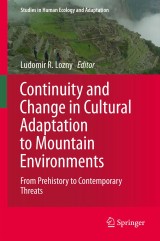Details

Continuity and Change in Cultural Adaptation to Mountain Environments
From Prehistory to Contemporary ThreatsStudies in Human Ecology and Adaptation, Band 7
|
96,29 € |
|
| Verlag: | Springer |
| Format: | |
| Veröffentl.: | 12.03.2013 |
| ISBN/EAN: | 9781461457022 |
| Sprache: | englisch |
| Anzahl Seiten: | 410 |
Dieses eBook enthält ein Wasserzeichen.
Beschreibungen
<p>Up until now, mountain ecosystems have not been closely studies by social scientists as they do not offer a readily defined set of problems for human exploitation as, do for instance, tropical forests or arctic habitats. But the archaeological evidence had shown that humans have been living in this type of habitat for thousands of year. </p><p>From this evidence we can also see that mountainous regions are often frontier zones of competing polities and form refuge areas for dissident communities as they often are inherently difficult to control by centralized authorities. As a consequence they fuel or contribute disproportionately to political violence. But we are now witnessing changes and increasing vulnerability of mountain ecosystems caused by human activities. </p><p>Human adaptability to mountain ecosystems This volume presents an international and interdisciplinary account of the exploitation of--and human adaptation to--mountainous regions over time. The contributions discuss human cultural responses to key physical and cultural stressors associated with mountain ecosystems, such as aridity, quality of soils, steep slopes, low productivity, as well as transient phenomena such as changing weather patterns, deforestation and erosion, and the possible effects of climate change. </p><p>This volume will be of interest to anthropologists, ecologists and geologists as mountainous landscapes change fast and cultures disappear and they need to be recorded, and mountain regions are of interest for studies on environmental change and cultural responses of mountain populations provide clues for us all. Critical to understanding mountain adaptations is our comprehension of human decision-making and how people view short- and long-term outcomes. </p>
<b>Ludomir Lozny</b> is current managing editor of the journal Human Ecology, and an adjunct professor at Hunter College in the Department of Archaeology.
<p><b><i>Continuity and Change in Cultural Mountain Adaptations: From Prehistory to Contemporary Threats</i> </b>presents an international and interdisciplinary account of human cultural adaptation to mountainous environments over time. Mountain ecosystems are critical to the wellbeing of sizable populations in Eurasia, the Americas, and Africa. The book presents the evidence on continuity of human cultural adaptation to mountain ecosystems and also on contemporary threats and vulnerabilities caused by intensification in mining, agriculture, and tourism.</p><p> The essays collected here discuss human responses to key physical and cultural stressors impacting human wellbeing in mountain ecosystems, such as aridity, quality of soils, steep slopes, industrialization and infrastructural change, low productivity, adverse effects of centralized political decision-making, deforestation and erosion, tourism, and the possible effects of climate change. The contributors who are cultural anthropologists, geographers, archaeologists, ecologists, and cultural resource managers and planners all point out that mountain populations cope with the stressors by adopting specific cultural strategies, such as seasonal migrations, integration of pastoral and agricultural production, animal crossbreeding, use of crop varieties, a mixture of communal and household control of land, trade, crop diversity, diversification of activities, and technological innovations and innovative scheduling of productive activities. </p><p><b><i>Continuity and Change in Cultural Mountain Adaptations: From Prehistory to Contemporary Threats</i> </b>will be of interest to archaeologists, cultural resource managers, anthropologists, ecologists, climatologists, and geologists because mountainous ecosystems change fast, and cultures disappear and they need to be recorded. Most importantly, cultural responses of mountain populations provide clues for us all in this time of environmental change.</p>
Explores human adaptation to mountain systems using a range of viewpoints, including anthropology, ecology, and geography Examines human effects on mountain systems, particularly in regard to human-caused climate change Uses numerous case studies from around the world to examine how different cultures respond to similar environments

















